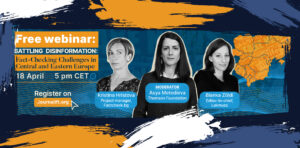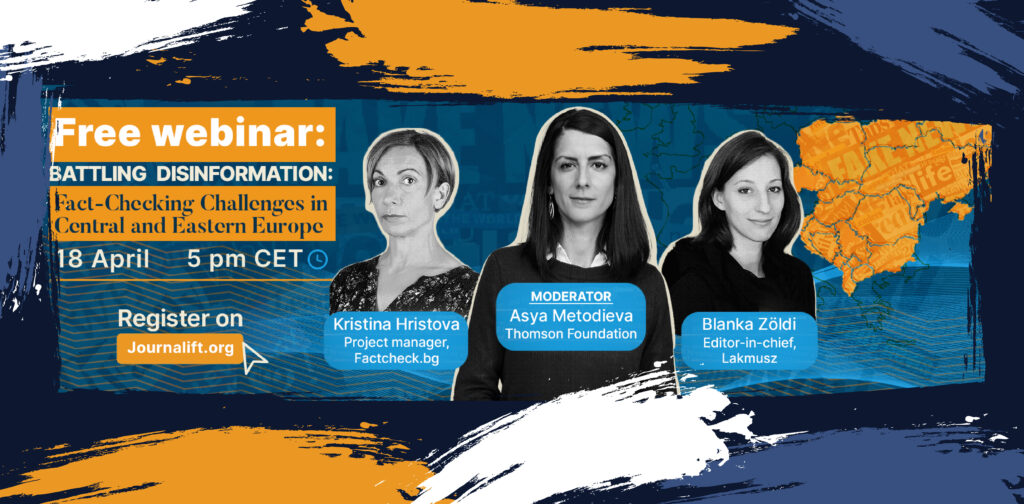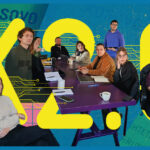“Radio Caffe” is one of the most beautiful places to go to in Požarevac. Not only because it has that wonderful word “radio” in its name, but also because you can see the love with which Milorad Tadić, the owner of Radio Boom 93 and of this café, has made this urban corner and all its details. Based on its appearance, this cafe could be located in New York, London or Amsterdam, but it has found its place about a hundred meters from the centre of Požarevac. As black-and-white photos of music idols of the generation born in the late 60s are watching us as from the ceiling and the walls surrounded by old radio sets, I am talking to Mišo-Bum (that’s how we call him for almost 30 years) about what to do next. Boom 93 is one of the media that received support within the “Media for All” project to improve its communication with users through its digital platform (www.boom93.com) and try to generate additional revenue.
Music against kitsch
Boom 93 is one of the oldest and most famous local radio stations in Serbia. During our student days in the early 90s, I had the opportunity to inspire Miša, a music lover, to establish a radio that enjoyed the same status in Požarevac as B92 in Belgrade. Always on the "wrong" side. There were talks about what none of the government wanted to talk about and there was music that was not very popular in the city of Marko Milošević and Dragana Mirković. Always looking towards the minority of people who wanted to live normally, to know what was happening and to listen to music that the majority does not understand and cannot stand. And he has been doing so for almost 30 years. Miša is stubborn, he doesn't give up. And I know he never will.
Gone are the days when radio could make a living from "selling" seconds. Not only in Serbia, but in the whole world. To make matters worse, in this area of ours, advertising has always been more "I will do it for you" kind of thing than a thoughtful investment of a businessman to improve his business. Eligible media received advertisements because of their suitability, the "free" ones could at best hope for some help "but no one would find out". There were a few who would risk visiting a financial or tax police in the following 24 hours by advertising through such media. That is why the business strategy of Boom 93 and similar media during all these years has been reduced mainly to "finding their way" and "surviving". They became masters at surviving.
If each person, who said the word "self-sustainability" to Miša during these thirty years, would have given 1 Euro to him for each time they mentioned it, Miša would be a rich man today - a boss. Instead, he "survives" even today. Each time the salaries are paid on time, and they are, it is considered as a success. When VAT is paid on time, and it is, it is an even bigger success. How he manages to do it - he doesn't know either. Just as none of us know how we stayed here in spite of everything and we continue to fight for what we believe in day by day.

The secret is in…
The secret, apparently, is in the diversification of income. We know that you can't make a living from advertising if you're not "one of theirs," although that doesn't mean that advertising shouldn't be. No matter how much they warned us that there would be no foreign donations forever, there are still some. Sometimes less, sometimes more, but it is a completely legitimate source of income and the media should approach them in the same way as advertising. That money exists and someone has to take it. If you have a good sales team, it does not mean that you should not have a good project team that will know how to communicate with potential donors, write and implement projects. Donors, just like advertisers, have their own needs and expectations, and you must have a good and qualified team that will be able to respond to that.
"Radio Caffe" was created in response to the need for one media to have multiple sources of income. Unlike the "eligible" ones who often establish and finance the media from their other activities in order to strengthen their position in society, the "ineligible" ones are forced to find other activities from which they could finance at least part of their media costs. To stay what they are. Hundreds of people have passed through this café to whom this space was available for book presentations, movie screenings, music or ideas. Everything that couldn’t find its place within the institutions, where such debates were supposed to take place, was discussed here. Instead of opening the door to them, the local government has been digging the street where café was situated for more than a year, thus making it difficult not only for the people who live there, but also for those who had to walk between the boards and through the mud to reach the café. Despite everything - they kept coming.
And just when this "model" of financing started working out, a pandemic broke out. The closure of catering facilities for several months and ban on public gatherings. The café became a weight around the neck for Boom 93. Instead of part of the income generated by the café being directed to journalists and radio hosts, they instead had to earn money for waiters who had no one to serve any more. "Survival again". Spring, summer, autumn, winter, and another spring.

Pandemics… and a new beginning
In such a situation, I started working with Mišo through the "Media for All" project.
The idea is to launch a crowdfunding action on the digital radio platform and open a radio souvenir shop, and at the same time to improve direct communication with the most loyal listeners and thus reach even more content of public interest.
The idea of raising funds from users of a media outlet is not new, but only a few of us in this part of the world have embarked on this adventure so far. The reasons are numerous and above all justified. First, there is a general perception that the media (their owners) have money and that users (listeners, readers and viewers) should not pay for it. People like Željko Mitrović reminds them of that every day, who greets his followers on Instagram from a party from an exotic destination, from a yacht or from a private plane. Dragan J. Vučićević admits that he bought four apartments in Belgrade in the last couple of years saying: "So what, I paid taxes".
Another big hurdle is the perception that everything on the internet should be free. It always has been, so why not now. Especially since everyone sees some advertisements on the Internet about that content, so they think that it is enough to cover the costs of the media. In addition, they keep hearing that the amount set aside for digital advertising increases from year to year. Tens of millions of euros in Serbia. However, they forget that almost 80% of that money goes to Google and Facebook and that all publishers and journalists who make that content should feed on the remaining 20%. And there are more than a thousand of them. Only in Serbia.
According to a survey conducted by the Faculty of Political Sciences in 2019 in cooperation with the BBC na srpskom, only about 4% of those who use the Internet for information are ready to financially support those platforms from which they get information. To make the situation worse, that small number of people is ready to support one or at most two platforms in the largest number. So there will be no money for everyone. Especially not for the smallest ones.

Examples of direct support to media
Only for Daško and Mlađa (www.daskoimladja.com), among all Serbian media projects, can be said they have managed to ensure their survival through donations from the public. These are two radio hosts from Novi Sad who work every working morning from 7 to 10 a.m. for about 500 of those who pay them and about 12,000 of those who listen to them. These are two (relatively modest) salaries and accompanying costs for maintaining their platform.
Initial steps in this area were made by the daily Danas through its "Readers' Club" as well as the research network "Krik", which manage to generate some income, but far from the amount that would cover their business costs.
Even the most popular portal in Serbia, Blic, through its subscription service intended for readers abroad, manages to reach just over 1,000 subscribers. One of the leading news portals in Kosovo, www.koha.net, recently launched its paid service and managed to reach 500 subscribers in the first few months.
We are talking about portals that have hundreds of thousands of users a day, and when it comes to Blic, more than a million. According to some information, similar initiatives are being considered in Sarajevo's Oslobođenje and Podgorica's Vijesti.
Of course, there are examples from abroad where newsrooms with a larger number of journalists manage to cover their costs through a subscription system or from user donations. However, we are talking about much more regulated markets and, more importantly, media that have been customer-oriented since day one. It is difficult to explain that for something that was free until now, you now have to pay.
I am sure that almost every digital media will have to turn to its users for financial support at some point. Let's not fool ourselves, most of these attempts will fail and only those few, who will have adequate communication with readers and gain their trust, will be able to count on their help in covering part of their costs. Will they be able to survive from that? Certainly not in the next few years, but that doesn't mean that they shouldn't start thinking about how they can start that process as soon as possible.

Let’s trust the brand
What can a relatively small local media outlet do in such conditions? If it decides to "lock" the site, it will immediately reduce the number of users to several tens, or hundreds in a better case, which will make that media lose its influence in its community. If, on the other hand, it would "cry out" for help without offering anything in return, it would immediately be faced with comments such as "Well, if you could make it by now, you can still go on", "Look at him, he has a radio and a café, and he asks me money "," He's lying, that guy has the money "and similar responses that come together as part of the edition of stories about good neighbourly relations in Serbia, collected in the unpublished anthology "Let the neighbour’s cow die".
Radio Boom 93 has the advantage of a decades-long brand that many in Požarevac believe in. They know that the radio helped them during the hardest times. But I'm not convinced that the cry for help of "Miša the boss" would encourage many people to grab their wallets, or at least not enough of them to provide at least 25% of the monthly budget. This 25% is an important number because I don't think it makes sense to start this operation to cover 5% or 10% of the budget. It would be useless. Of course, that does not mean that you would get 25% in the first month, but to have that as a goal of a 12-month campaign can be ambitious, but achievable.
On the way to that goal, in my opinion, it is necessary to do the following:
- Focus even more on local topics and content relevant to people living in and around Požarevac. Local, local and only local, with information that has value. I do not mean rewriting the announcements of local self-government bodies, but stories that will deal with the problems of ordinary people. These stories can have a wider meaning and show that they can have an audience outside Požarevac.
- For all who want to join the "Boom 93 Club", prepare special gifts (souvenirs) as a sign of welcome. Eventually, three categories of members should be considered immediately, depending on the monthly subscription they are willing to pay, or the time for which they will subscribe. I think it is worth trying to keep the minimum membership period to 3 months, because it has already been shown that it is very difficult to "translate" someone who joined for a month and the next month.
- Immediately create a closed Facebook group with club members where communication related to content that would be interesting to them would begin. Maybe a column #vasaprica could be launched, in which a story initiated by a member of the Club would be done once, and later twice a week, in which he would appear as a co-author.
- With the help of sponsors and existing advertisers, a monthly prize game could be organized in which everyone who joined the Club that month (or had a subscription for that month) would compete for one of the 3 prizes. This game should last 12 months.
- The key to attracting members is content. "Radio Caffe" could also play its role, in which something would be organized once or twice a month only for the members of the Club.
- In cooperation with advertisers and sponsors, it is necessary to examine the possibility of discounts for Club members for their products and services.
- Design and elaborate a promotional campaign for membership in the Club, which must be conducted during all 12 months.
I am aware that all this is not easy to realize, especially in the local media, which have an extremely small number of employees. It will not be easy to impose new obligations on them. However, I do not see what the alternative is. To continue "as before" and hope that someone will give money because we need that money sounds nice, but it belongs to the section "not happening". The worst thing a trusted media can do is deceive its user. To promise him that he will get something, without fulfilling that promise. Taking money from someone for a month or two will cost much more later. You have to keep in mind that every user can leave us with one click or push of a button. No guarantee that he will ever return.
And without them, there will be no us. And it should be like that.































